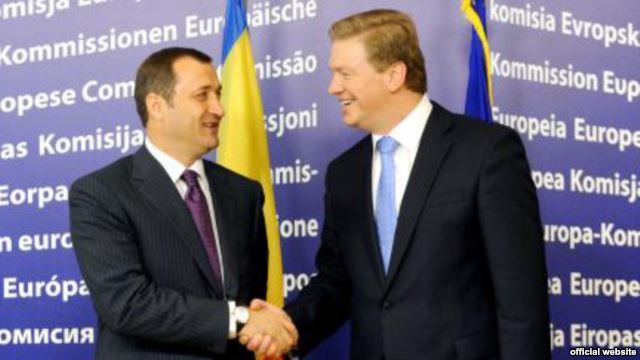
Moldova, the European Union and the Vilnius Summit (Part One)
Publication: Eurasia Daily Monitor Volume: 10 Issue: 208
By:

The European Union and Moldova are fully set to initial an Association Agreement (AA) and a Deep and Comprehensive Free Trade Agreement (DCFTA) at the EU’s Eastern Partnership Summit on November 28¬–29 in Vilnius, under the EU’s Lithuanian presidency. Moreover, uniquely for Moldova at the summit, the European Commission will confirm the country’s successful implementation of the Visa Liberalization Action Plan, and will recommend allowing visa-free travel to the Schengen area for Moldova’s citizens with biometric passports.
Ukraine and the EU had initialed the AA and DCFTA already in 2012, and were supposed to sign these documents at the Vilnius summit. Ukraine, however, has yet to fulfill certain preconditions for those documents to be signed, casting the outcome into doubt until literally the last moment (see EDM, November 12, 14). Unrelated to this, Ukraine has not yet completed its action plan to qualify for EU visa liberalization (European Commission, Progress Report on Visa Liberalization Plans, November 15). Neither has Georgia reached this stage, although Georgia will initial an AA and DCFTA at the Vilnius summit, alongside Moldova. The EU, Azerbaijan, and Belarus (each for its own reasons) do not aspire to conclude AAs, DCFTAs, or visa liberalization agreements at this time; while Armenia has already announced that it has chosen Russia over Europe.
As a net likely outcome, the EU-Moldova agreements almost guarantee the summit’s success, even if it falls short of the strategic triumph that the signing of EU-Ukraine agreements might yet bring. Once initialed at Vilnius, the EU-Moldova documents are realistically expected to be signed and enter into force during the next 12 months, on a calendar correlated with Moldova’s parliamentary elections due in November 2014. That success would enable Moldova’s pro-Europe government to decisively and irreversibly defeat the Communist Party, which remains the most popular single political party by far in this country for the time being.
Thus, the EU-Moldova Vilnius agenda is already moving toward the post-Vilnius stage on the road to Riga, site of 2015 Eastern Partnership summit under the EU’s upcoming Latvian presidency. But, starting already at Vilnius, the EU and the Moldovan government’s Western-oriented element must plan how to tackle the two main challenges: rebuilding the deeply dysfunctional political and legal systems, and reversing the process of state capture by local and Russian business interests in Moldova.
These two challenges are inter-related. To tackle them, the EU Commission and those European governments that are primarily driving the Eastern Partnership program will need a policy reappraisal. Moldova’s incumbent governing coalition amounts to a shotgun marriage, forced upon Chisinau from 2010 to date: internally, by fears of a Communist revanche; and externally, by well-intentioned EU officials seeking to portray Moldova as a “success story” (a line they could no longer sustain this year) and at all cost to avoid a collapse of the coalition en route to Vilnius. This government includes three very disparate groups in an inherently unstable arrangement.
The Liberal-Democrat Party led by Vlad Filat (prime minister, 2009-April 2013; followed by Iurie Leanca since May 2013) and this party’s ministerial team has borne the brunt of work to implement the Moldova-EU Action Plan and to qualify Moldova for the AA, DCFTA, and visa liberalization (see above). Moldova’s achievement at Vilnius is unequivocally this team’s achievement. They have been in charge of the relevant ministries and agencies (including foreign affairs, interior, justice, border protection) and they have delivered the results.
The Liberal-Democrat Party is the largest non-communist party (31 parliamentary seats, more than the other two coalition parties combined, in the 101-seat parliament). Exceptionally in Moldova, this party is united around its political leader Filat and around the European agenda. This party is one of the very rare factors of political stability and policy continuity in Moldova.
The Democratic Party, led de facto by the billionaire Vlad Plahotniuc (though officially by parliamentary front-bencher Marian Lupu) controls key positions in the court system and most law enforcement agencies, as well as large portions of the private business sphere. The party’s political ratings since 2011 are consistently low, dragged down by Plahotniuc’s negative image, despite ample political funding and control over several television channels.
The European integration agenda has not been this party’s priority, although it has supplied votes in parliament for passing the necessary legislation. The Democratic Party’s priority since 2010 has been to negotiate the division and re-division of the spoils of governance in its favor, at every stage of Moldova’s continuous political crisis. At every stage, the Democratic Party threatened to withdraw its support from the Filat- or Leanca-led government, unless the government conceded some key posts or business opportunities to Plahotniuc-affiliated interests. In the latest case of this type, the government’s majority reluctantly agreed to hand over Chisinau International Airport to an obscure Russian company, lest the Democratic Party bring down the government in the run-up to the Vilnius summit and derail the event (see EDM, October 8, 9).
The Liberal Reformer Party, smallest by far in the governing coalition government, split off from the Liberal Party earlier this year and replaced the mother party in the government. The Liberal Reformers are basically a party of intellectuals, genuinely pro-Western, and least tainted or possibly untainted by corruption. But they seem poorly placed to re-enter parliament in 2014. The original Liberal Party—under the uncle-and-nephew tandem of party leader Mihai Ghimpu and Chisinau mayor Dorin Chirtoaca—seems to retain its grip on the 10 percent of voters with Romanian irredentist sentiments.
The EU’s Enlargement Commissioner, Stefan Fuele, recently summoned the top leaders of the coalition’s three parties to Brussels for a dressing down over corruption. Fuele distributed his strictures, as he has all along, in an undifferentiated manner between Plahotniuc’s and Filat’s groups (Kommersant Moldovy, November 9). Fuele has pulled Moldova toward the EU with the force of a locomotive during his tenure (soon to expire) as commissioner. This will be a part of his legacy. But his undifferentiated attitude toward these two groups has missed the real differences between them, playing repeatedly into Plahotniuc’s hands, and cornering Filat’s group. At every round of re-negotiating coalition arrangements, Filat’s group had to yield to twin pressures: Plahotniuc’s group threatening to topple the government, and Brussels demanding the government’s preservation at all cost. If Brussels plans to assist a reconstruction of Moldova’s government after Vilnius, it will need to differentiate appropriately between these political parties.




